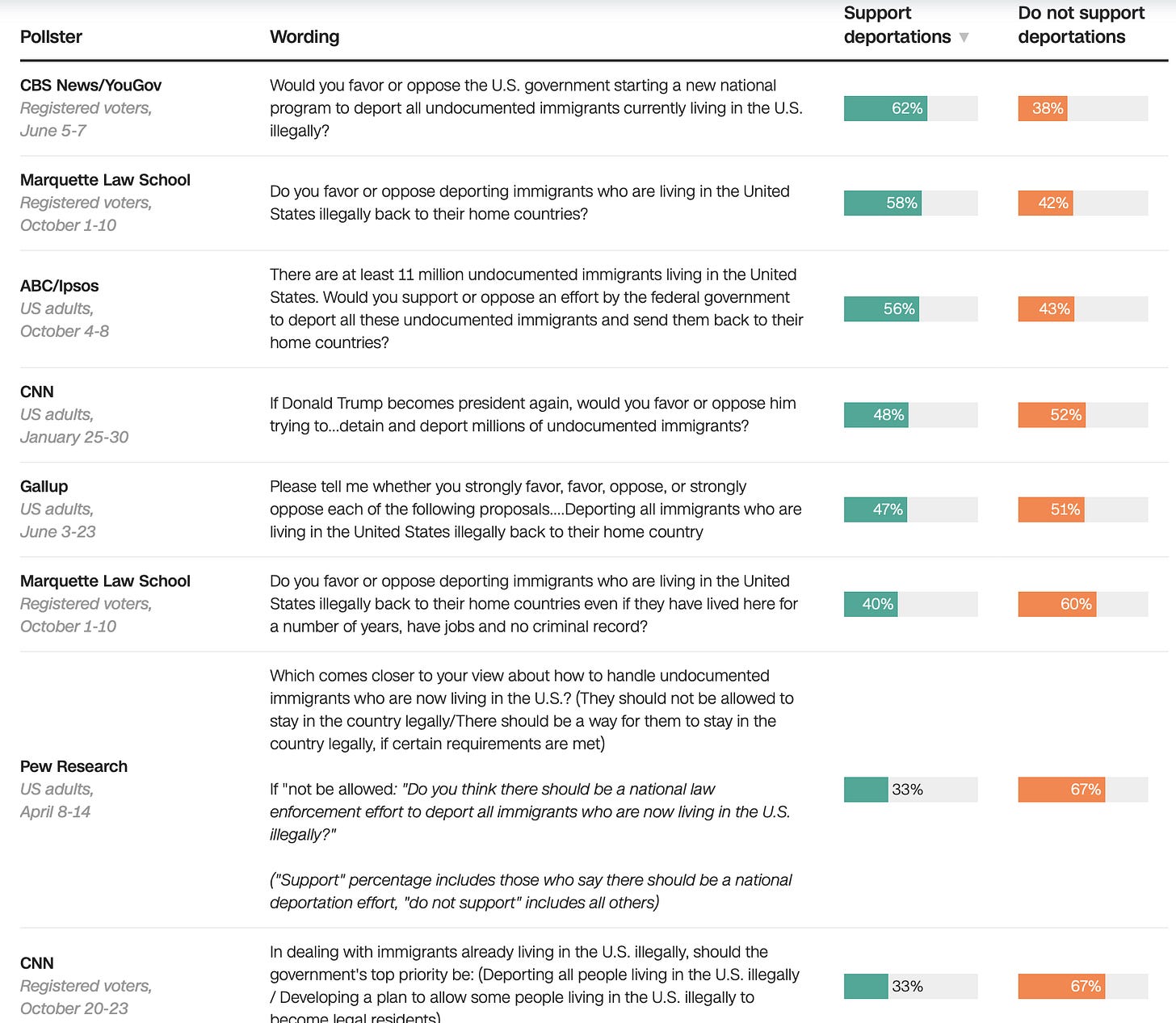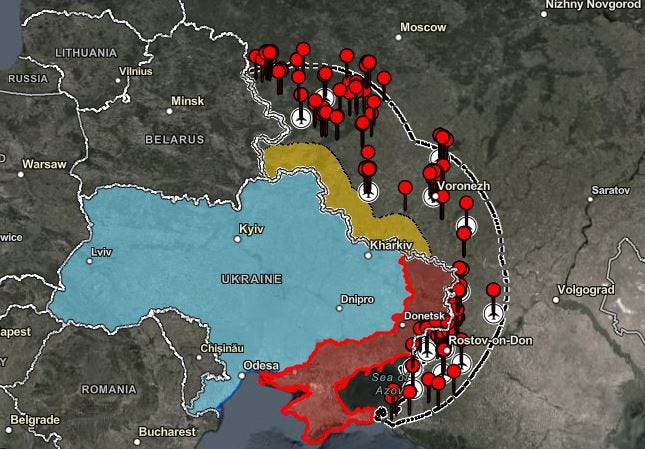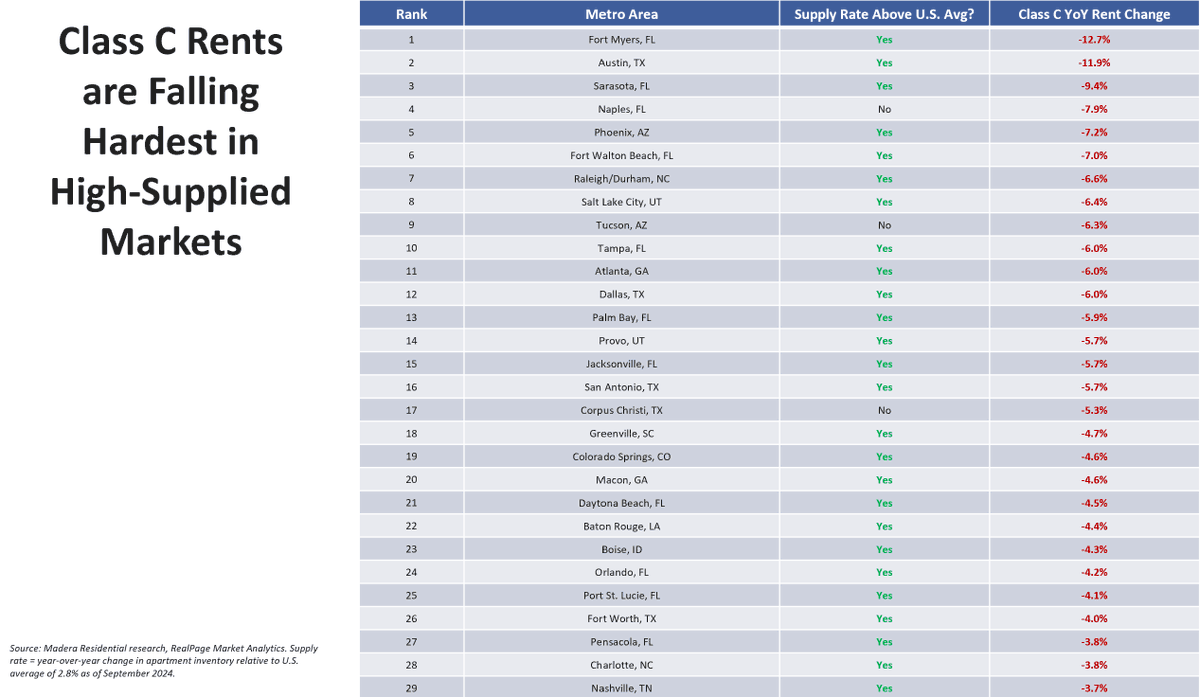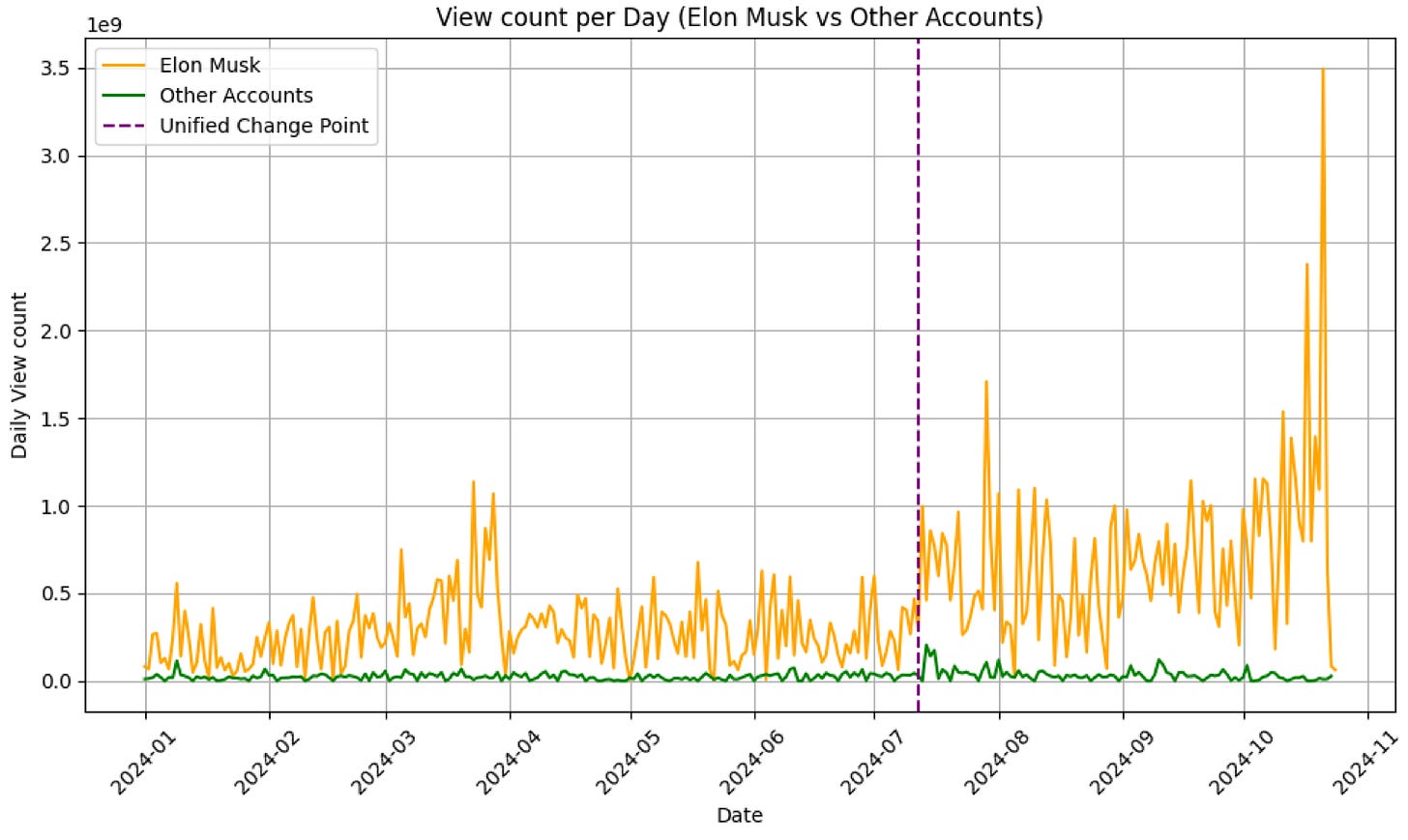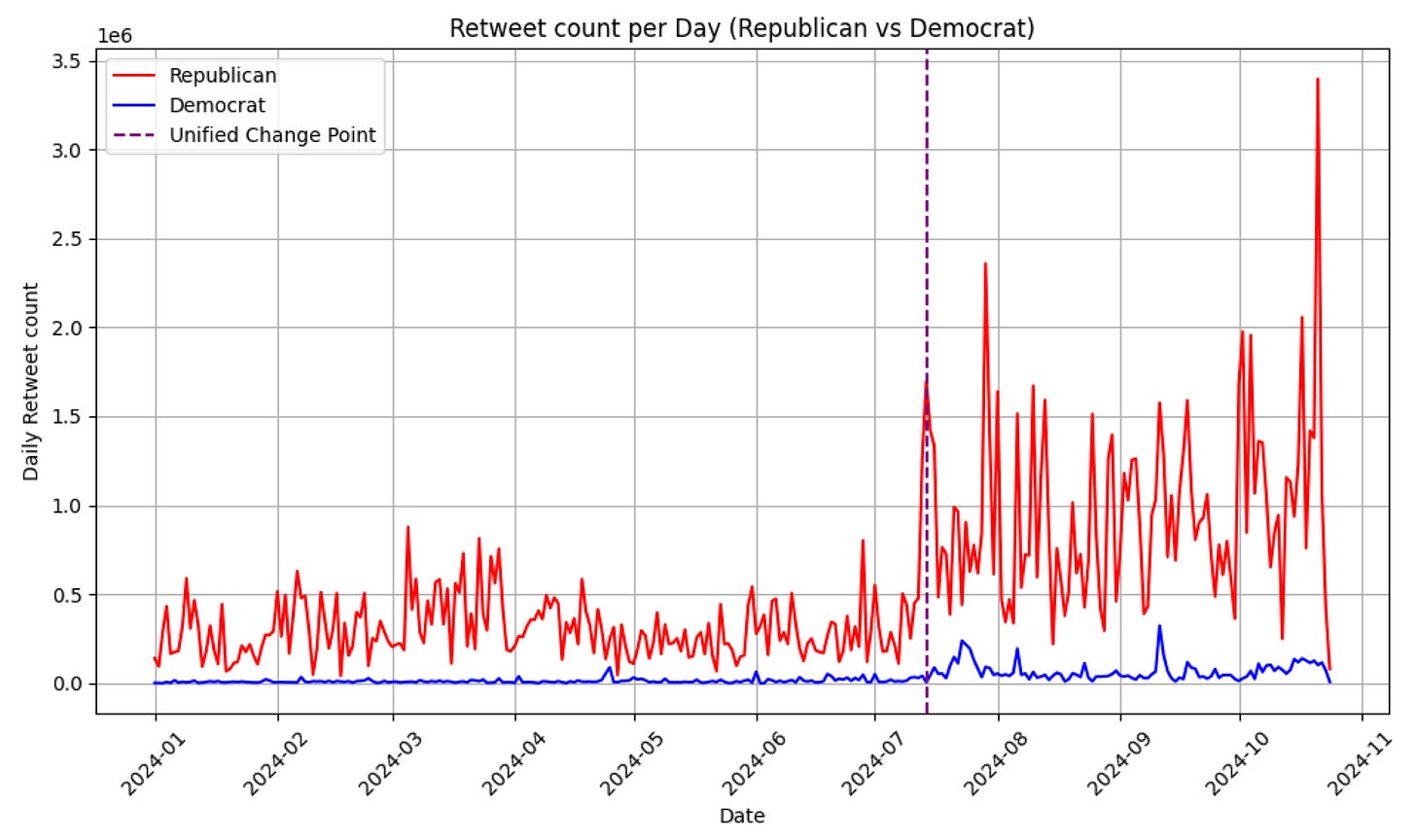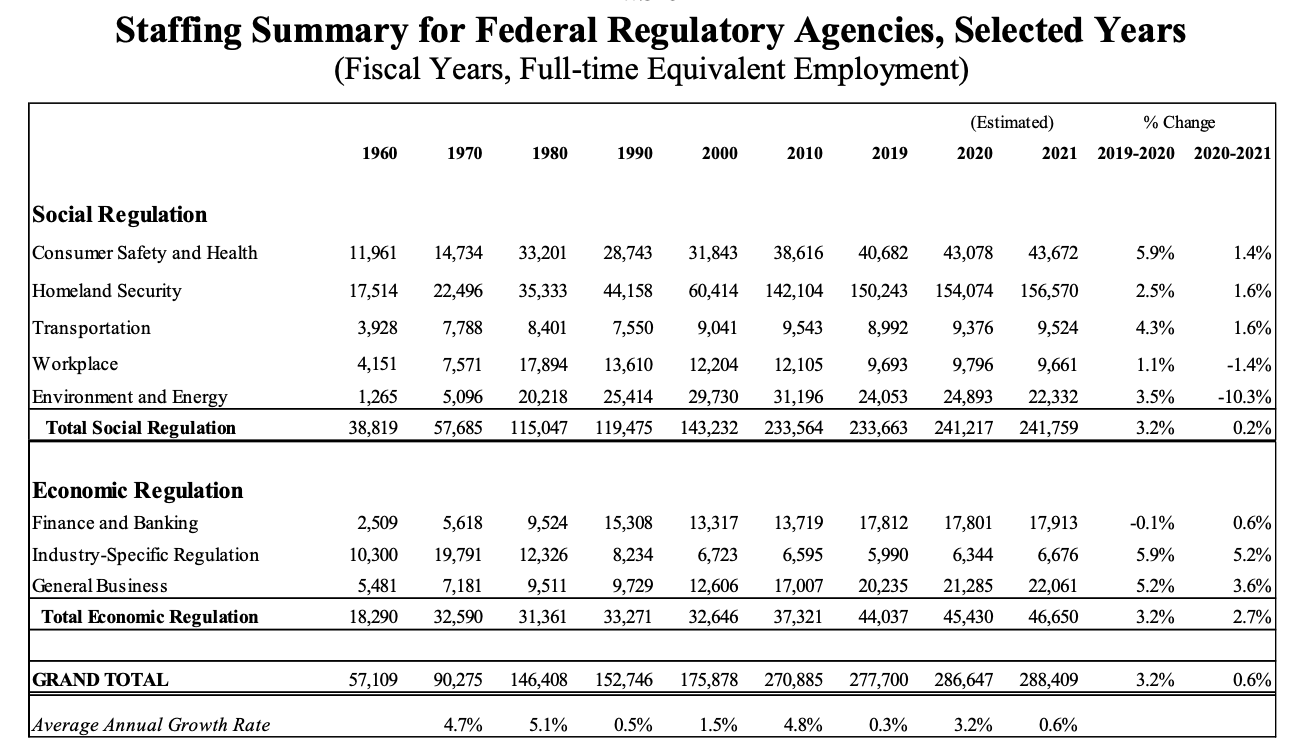Trumpdate (11.19.24):
deportations, Iran & algorithms
EXECUTIVE SUMMARY:
NEWS NEWS
Immigration Policy: Trump plans military-led mass deportations and aims to end birthright citizenship.
Cabinet Controversy: Defense pick Pete Hegseth paid accuser in sexual assault case under NDA.
Media Lawsuits: Trump sues multiple media outlets for billions over critical coverage.
Middle East Conflict: Israel reportedly destroyed Iranian nuclear facility and significantly damaged Hezbollah's missile capabilities.
Security Vetting: Trump team bypassing FBI background checks for some Cabinet nominees.
Ukraine Support: Biden authorizes ATACMS use against Russia in Kursk region as Russian economy struggles.
NOT NEWS NEWS
Military Spending: China's military budget has quietly grown to nearly match US levels.
Food Industry: Analysis reveals sugar actually more prevalent than high-fructose corn syrup in products.
Economic Analysis: IMF finds no correlation between COVID stimulus spending and inflation rates.
Housing Market: Areas with highest new apartment supply seeing largest rent reductions.
Air Quality: Delhi leads world in poor air quality, triple the levels of second-place Dhaka.
Social Media Influence: Study shows TikTok algorithm promotes pro-China content to GenZ users.
Platform Bias: Study reveals X's algorithm boosted Republican-leaning accounts after Musk's Trump endorsement.
Crime Statistics: Comparison of US vs European homicide rates.
Regulatory Facts: Analysis debunks Musk's regulatory criticism, showing DHS growth accounts for most increases.
1.) AXIOS: Trump confirms plans to use military for mass deportations
President-elect Trump confirmed plans to declare a national emergency and use the military for mass deportations, targeting 11M undocumented immigrants. Advocates prepare legal challenges as Trump fills his Cabinet with immigration hardliners like Tom Homan and Kristi Noem.
[TS] Support for mass deportation varies on how the question is asked:
If this program gets off the ground, it will be interesting to see how the public reacts.
[RELATED] Trump takes aim at birthright citizenship per NYT: Trump Confirms Plans to Use the Military to Assist in Mass Deportations
[TS] The article expands a bit on the above, but one notable line:
And the team plans to stop issuing citizenship-affirming documents, like passports and Social Security cards, to infants born on domestic soil to undocumented migrant parents in a bid to end birthright citizenship.
That will be quite the change. I have not seen polling on this — OK, did some digging. YouGov polling from June 2023 puts support at 60%:
I actually don’t think this is the wildest idea out there. I think the largest hurdle will be the 14th amendment where it clearly states:
“All persons born or naturalized in the United States, and subject to the jurisdiction thereof, are citizens of the United States and of the State wherein they reside.”
This has also been upheld by SCOTUS. Take the 1898 case: United States v. Wong Kim Ark (1898):
• Ruling: The Court held that children born in the U.S. to foreign parents who are legally residing in the country are U.S. citizens under the 14th Amendment.
Not a lot of wiggle room there. Granted, I don’t know how much the current court cares about precedent.
Why would I say it’s not a wild idea?
I think the easiest way to think about this would be to look at other countries. The US (and Canada!) is actually an outlier in terms of unconditional birthright citizenship. For example:
Australia: Children born in Australia acquire citizenship only if at least one parent is a citizen or permanent resident at the time of birth. Otherwise, the child can become a citizen after living there for 10 years.
New Zealand: Similar to Australia, citizenship is granted at birth only if at least one parent is a citizen or resident.
France: Children born in France to foreign parents are not automatically citizens but can apply for citizenship later (usually at age 18) if they meet residency requirements.
Germany: A child born in Germany to foreign parents becomes a citizen only if at least one parent:
• Has lived legally in Germany for at least eight years, and
• Holds permanent residency at the time of the child’s birth.
UK: Children born in the UK are not automatically citizens unless at least one parent:
• Is a British citizen, or
• Has settled status (e.g., indefinite leave to remain) at the time of the child’s birth.
Japan: NO birthright citizenship. Foreign-born individuals, including those born in Japan to foreign parents, can apply for Japanese citizenship through naturalization. However, the process is strict, requiring:
• Continuous residency for at least 5 years.
• Demonstrated financial stability.
• Renunciation of other citizenships (Japan does not allow dual citizenship for naturalized citizens).
I think both sides of the argument have valid points. The weakest argument for unconditional birthright citizenship is “because it’s been that way for a long time.” Even arguing “because it’s an amendment” isn’t particularly compelling to me on rational, moral, or ethical grounds. However, it is compelling from a pragmatic standpoint—overturning a constitutional amendment would be extraordinarily difficult, requiring either a two-thirds majority in Congress and ratification by three-fourths of the states or a constitutional convention.
2.) WaPo: Defense pick Hegseth paid accuser but denies sexual assault, attorney says.
Pete Hegseth paid a woman who accused him of sexual assault as part of a nondisclosure agreement, though he maintains their encounter was consensual, according to Hegseth's lawyer and docs obtained by WaPo.
Hegseth agreed to pay an undisclosed amount to the woman because he feared that revelation of the matter "would result in his immediate termination from Fox," according to a statement from his lawyer.
3.) GUARDIAN: Trump sues for billions from media he says is biased against him
President-elect Trump has intensified his attacks on the media with lawsuits against the New York Times, Penguin Random House, CBS, and others, demanding billions in damages over critical coverage. Media groups warn these actions endanger press freedom, fueling a hostile climate that threatens journalists and undermines citizens’ right to information. Press advocates call for protections as fears grow over escalating attacks during Trump’s second term.
4.) Israel War Update
AXIOS: Israel destroyed active nuclear weapons research facility in Iran, officials say
AXIOS reports that Israeli strikes on Iranian military facilities last month destroyed an active nuclear weapons research facility outside of Tehran. According to the report, the strike significantly damaged Iran’s efforts to resume nuclear weapons research.
President Biden asked Netanyahu not to attack the Iranian nuclear facilities… but this facility was not part of Iran's declared nuclear program, so the Iranians couldn’t complain without admitting they violated the NPT.
Most of Hezbollah’s inventory of 150,000 missiles and rockets has been destroyed
Per Elliot Cohen,
Most of Hezbollah’s inventory of 150,000 missiles and rockets has been destroyed—more than 80 percent, according to the Israelis—and the group’s ability to coordinate has been so fractured that instead of the feared volleys of 1,000 projectiles a day, it struggles to launch 50 or 100.
Netanyahu in the Knesset says that the IDF has taken out all of Iran's air defense systems.
"In April, we dismantled 1 of 4 Russian S-300 batteries around Tehran. In October, the remaining 3 S-300 batteries were also destroyed."
5.) CNN: Trump’s team skips FBI background checks for some Cabinet picks
Trump’s transition team is bypassing traditional FBI background checks for at least some Cabinet picks while using private companies to vet potential candidates for admin jobs.
In his first term, Trump ordered clearances to be granted to about 25 people whose applications were initially denied for possible national security concerns.
6.) NYT: Biden Allows Ukraine to Strike Russia With Long-Range U.S. Missiles
With two months left in office, the president for the first time authorized the Ukrainian military to use the system known as ATACMS to help defend its forces in the Kursk region of Russia.
[TS] Article mentions this ONLY extends to the Kursk region. Granted, Ukraine will have ample targets within the ATACMS range to choose from. I have never understood why this wasn’t allowed to begin with.
Potential Targets (via Study of War):
[RELATED] Express (UK): Russian economy on brink as mortgages explode and home buyers face £752k repayments
The maximum level mortgage rate at several banks has now gone over 30%, in a move that is likely to have shattering consequences for Russia's property market.
[TS] This is going to put a lot of pressure on Russia. I imagine Trump and co will extend a lifeline once they get into office. Drop sanctions? Unfreeze Russian assets? I’ll be keeping an eye out.
[RELATED 2] CNN: Russia is locking up butter as inflation crisis reaches new heights
Inflation is being driven by the rapid rise in wages as the Kremlin pours billions into military industries and sends millions of men to fight in Ukraine. In the middle of a war, companies outside the defense sector can’t compete for workers without paying much higher wages. In turn, they charge higher prices. So the spiral continues.
QUICK BITES:
Trump says on Truth Social he wants to investigate the Des Moines register which produced the poll (from Ann Selzer) that said he would lose Iowa:
Trump nominates Brendan Carr, former General Counsel for the FCC, and former FCC Commissioner (he focused on issues like rural broadband, 5G infrastructure, and telecommunications policy).
[TS] Notably, he also wrote the FCC Chapter in Project 2025. I’ve also seen that he has been a massive champion for Elon Musk and his Starlink system (chairman of the F.C.C. controls orbital access by space communications companies in the US.). In the future I may do a brief writeup on SpaceX and Starlink.
NewRepublic: Per Greg Sargent: “Senate investigations into Trump's solicitation of $1 billion from Big Oil and Jared Kushner's financial dealings with Saudis will now hit a wall with GOP control, Dems tell me.” [TS] There’s going to be an incredible amount of self dealing.
Roll Call: House version of Farm Bill would prevent Trump from unilaterally bailing out trade war-hit US farmers like he did last time:
7.) AEI: China’s Real Military Budget Has Quietly Become Almost as Big as Ours
[TS] Full report is an interesting read, but the figures are illuminating:
8.) [TS] How prevalent is high-fructose corn syrup?
MotherJones had a great piece by Tom Philpott on “The Secret History of Why Soda Companies Switched From Sugar to High-Fructose Corn Syrup.” Well worth a read, but I was fascinated to learn that high-fructose corn syrup has never been as popular as regular old sugar:
[TS] Why did companies move to HFCS? Mostly from:
Ag lobbying Congress to Congress to impose a quota on foreign-produced sugar = drove up the price of sugar
Corn subsidies which results in farmers planting more corn than needed, which results in corn producers finding other ways to sell the product. This spawned two products (both can come from the same “wet-milling” plant):
Ethanol (used for gasoline)
High-fructose corn syrup (sugar substitute)
RFK Jr. has said he wants Coca-Cola/Pepsi to use cane sugar instead of HFCS, but that issue would be solved if you just fix the above (2). Likely no appetite for that in R circles, though.
9.) IMF: Counties with greater stimulus spending didn’t see higher inflation.
[TS] I was a bit surprised seeing this graph as you would expect to see a higher correlation between a stimulus and inflation (considering a bigger stimulus would = more cash = more demand = higher prices = higher inflation).
[TS] I think politically, the question becomes: What should the govt. do next time? It is clear that people really do hate inflation, more-so than just about any other factor. It overrides:
GDP
Stock market
Wage growth
Wealth growth
Unemployment
Side note on the “Why?”:
First, inflation is immediately noticeable in everyday life—through higher prices on goods, gas, etc. Second, its psychological impact is disorienting. Consider this example: if presented with two scenarios—(A) high inflation with higher wage growth, resulting in greater cumulative wages and more spending power, or (B) low inflation with stagnant wages, resulting in slightly less spending power—most people would likely choose option B.
Why? Inflation feels like an external force eroding their stability, while stagnant wages are tied to factors like promotions or raises, which they feel they can influence. People prefer scenarios where perceived control over their circumstances outweighs external, unpredictable forces acting upon them.
So, what should the government do? Would it be better to:
Reduce stimulus to keep inflation lower and avoid drastic interest rate hikes, even if it means extending the period of higher inflation, or —
Opt for a bigger stimulus, accepting a spike in inflation and sharp interest rate hikes to tame inflation over a shorter timeframe.
Unclear what the true answer is, but given the above, I think the shorter timeframe would benefit the incumbent.
10.) Rents fall in high-supplied markets
[TS] In a shock to no one who reads the Trumpdate, the places that build the most apartments see the biggest reductions in rent.
Jay Parsons (who I’ve featured before), has done a great job at tracking rents nationwide. Of the 29 areas where rents fell by more than 3.5%, 26 had new apartment supply above the U.S. average:
11.) IQAir: Delhi (India) has the worse air quality of any city in the world. 3x+ over nearest Dhaka (Bangladesh).
[TS] Does make me question their source, but they do cross check the data with independent communized-operated monitors, and they do have their own sensors.
12.) NCRI: The CCP's Digital Charm Offensive: How TikTok's Search Algorithm and Pro-China Influence Networks Indoctrinate GenZ Users in the United States.
[TS] Really interesting report from the Network Contagion Research Institute. I’ll highlight a few pieces:
Algorithmic Bias: TikTok systematically amplifies pro-China content and suppresses anti-China narratives, particularly on topics sensitive to the CCP, such as human rights abuses.
Psychological Manipulation: Heavy TikTok users (those who use 3 or more hours on the platform daily) “showed a 49% increase in positivity towards China’s human rights records relative to non-users. By contrast, use of YouTube and Instagram showed no significant relationship on users’ perception of China’s human rights record.” [TS] That is remarkable.
Hashtag Hijacking: The CCP uses tactics like hijacking trending hashtags to flood platforms with irrelevant or distracting content, effectively suppressing critical narratives.
[TS] It raises serious questions about whether the U.S. should permit an app from an adversarial nation to shape public opinion, influence cultural perceptions, and potentially manipulate political discourse among its population.
Trump was for the TikTok ban originally, now (with the help from Jeff Sass, who has a $15B stake in TikTok) it seems like he’s against it.
[TS] Speaking of media influence…
13.) A computational analysis of potential algorithmic bias on platform X during the 2024 US election
The study by Timothy Graham (Queensland University of Technology in Brisbane Australia) and Mark Andrejevic, analyzed 56,184 posts sent by a number of accounts between January 1, 2024 and October 25, 2024 and examined view counts, retweet counts, and favorite counts for each
[TS] The gist: X's algorithm was changed in mid-July 2024 to systematically boost Republican-leaning accounts and Elon Musk's own account following his endorsement of Donald Trump.
As an FYI - Musk made his endorsement of Trump on July 13, 2024.
The analysis found "a structural break for Musk's metrics around July 13, 2024" following which his view counts increased by 138.27% and retweets increased by 237.94%, with a similarly large increase for favorites. This was far in excess of other accounts monitored:
The authors conclude that the results "indicate that Musk’s posts received a marked increase in visibility (view counts), amplification (retweet counts), and user interaction (favourite counts) that outpaced the general engagement trends observed across the platform.
The analysis also found a large increase in view counts, retweet counts, and favourite counts, for Republican-leaning accounts, but not for Democrat-leaning ones. Again, the break point for this appears to be July 13, 2024, suggesting a platform-wide algorithmic change:
14.) US vs Europe by homicide rate.
15.) Fact Check on Elon
Elon retweeted this graph with the comment: “There are so many regulators that it’s like a sports game with more refs than players on the field!”
However, Jordan Weissmann tracked down the numbers behind the graph and found that “Almost the entire increase in "regulators" it shows is actually due to the growth of the Department of Homeland Security:”
[TS] Not saying it’s not worth looking into by Elon, but I do think it warrants some context before firing out a random tweet (that is algorithmically boosted) to your millions of followers.



